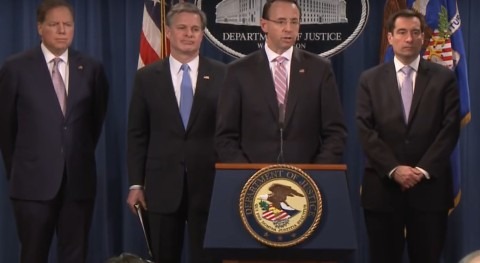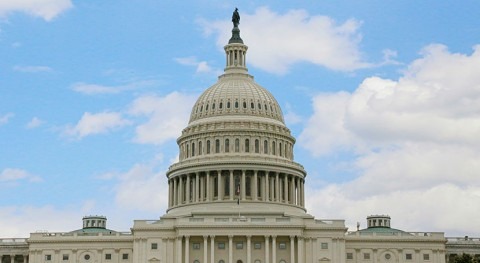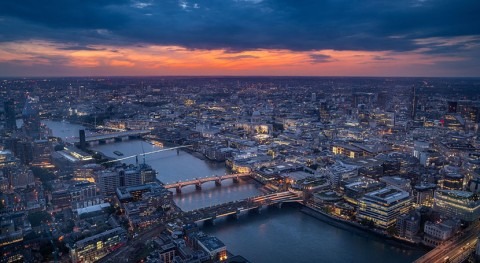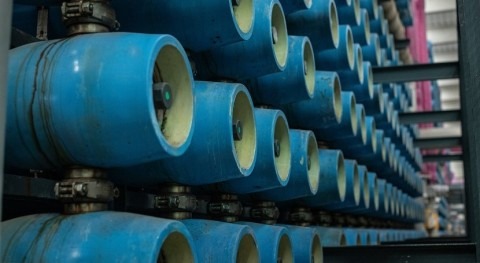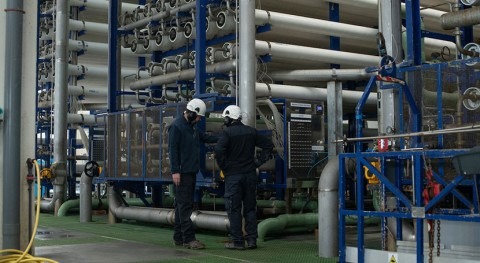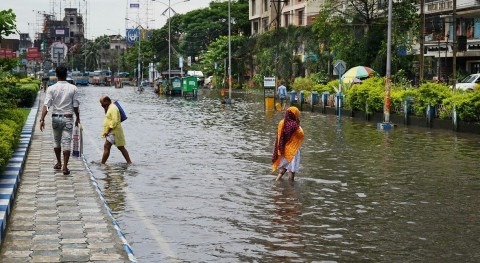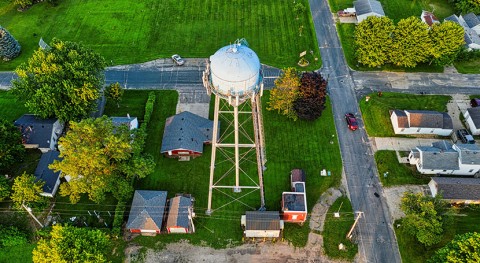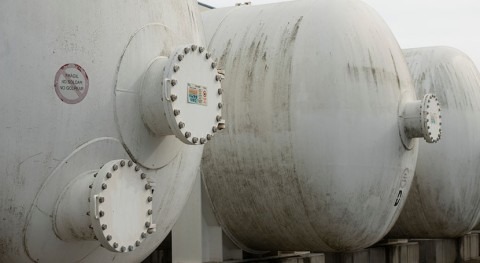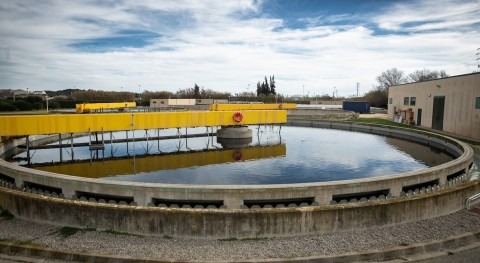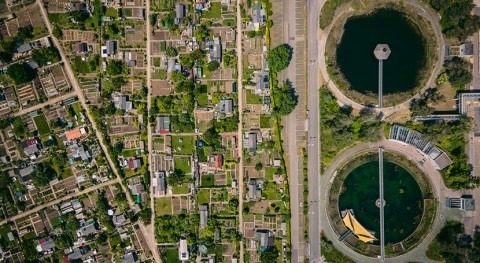Mercedes Martín, meteorologist and weather presenter for Antena 3, the Spanish television channel, defines herself as 'passionate about oceanography and climate'. Her knowledge of climate and her thoroughness when it comes to conveying daily weather information make her one of the most followed TV figures nowadays.
Moreover, she has a precise vision about climate phenomena, which she explains in detail but simply, as the great communicator that she is, during this interview.
Question - Ms Martín, firstly, we would like you to describe your professional profile. How did you become an expert in meteorology and oceanography?
Answer - I am a meteorologist and have been the weather presenter for the morning news edition of Antena 3 television for 3 years. When I first walked into the classrooms of the University of Cádiz to study Oceanography, I never thought I would end up here. When I arrived there from my home town, Écija, I was thrilled, because I had always dreamed of working on something that had to do with the sea.
When I was a little girl, my parents used to take me to the beach at Isla Cristina every summer, and according to my mother I loved to spend time just looking at the waves from the shore. I have always had a special connection with the sea. At the University of Cádiz I had the opportunity of getting a degree in the subject, but I needed to get further training and specialise. So, I left Cádiz, which I love, and headed to cold Munich to study applied remote sensing at the Technical University of Munich. From there, I had the opportunity to go to the National History Museum and work on the 'Throughflow Project', part of the Marie Curie Research Programme, where I helped researchers reconstruct the origins of biodiversity in the most diverse marine ecosystems on Earth. Our aim was to understand how the past shaped the living ecosystems and use this information to better predict the impact of ongoing environmental changes.
One year later, I came back to Spain to continue my education. I specialised in Meteorology at the Faculty of Physics. Then I did an internship at Televisión Española, and I was able to continue my career in the communications field. The young woman who planned to go on board of a French ship to study the Equatorial Atlantic Ocean ended up in a television studio.
Q - As an expert in meteorological information, do you think the audience is more interested in following the current situation now that global warming is mentioned so often?
A - Yes, the public is aware that climate change will decrease their well-being. Climate change does not only mean that the Earth's temperature is increasing; the price of our bills will also increase.
The frequency and the severity of extreme weather events arising as a result of climate change — floods, cold or heat waves and drought periods — have increased in the past few decades, and in Spain we are experiencing it.
These events raise the need to manage risks and disasters arising from them, to improve our adaptation to global change. As a result of the increase in average global temperature throughout the rest of the 21st century, it is quite probable that the frequency of extreme events will continue to rise. In Europe, the biggest risks will be floods, the availability of fresh water, as well as record heat episodes, as the Intergovernmental Panel on Climate Change (IPCC) warns.
 Q - Why do you think that there should be professional meteorologists fully aware of climate change?
Q - Why do you think that there should be professional meteorologists fully aware of climate change?
A - Climate change is a burning issue, but few people can explain what it involves, what are the consequences, what causes it and how to address it or mitigate its effects; that is our challenge: provide thorough, honest, transparent information, without being alarmists.
Information is now widely available; Internet has revolutionised the way things are told, and in these times of 'fake news', it is even more necessary to have a thorough vision of the facts. This is why specialisation is essential. You need a well-informed society to make knowledgeable decisions on issues; sometimes they will be difficult decisions, and entail a degree of uncertainty. And although there are sceptics, few people now question that the Earth is undergoing a process of climate change, and that, for the first time in the history of our planet, this phenomenon is caused by human actions, as the IPCC revealed. Rainforest deforestation, the hole in the ozone layer, the degradation of our oceans and the massive emission of millions of tonnes of greenhouse gases into the atmosphere are taking the planet to an extreme where the consequences could be devastating. Society has the right to know and also the obligation to take action. Our obligation is to provide information and be proactive.
Q - How is this phenomenon affecting our country's climate outlook?
A - Spain would be one of the European countries most affected by climate change, and one of the most direct effects would be the disappearance or disturbance of ecosystems. Of special concern is the survival of the Cantabrian brown bear, but also the proliferation of exotic species due to higher water temperatures, such as jellyfish or the zebra mussel, which affect native fauna and flora.
Agriculture would also experience the effects of climate change. In fact, the wine industry is already seeing how climate change affects their production, with a greater risk of frosts, shorter times for grapes to mature, water scarcity and changes in pest and disease patterns.
Those sectors than depend directly on climate, such as tourism, will also feel the effects. At certain times of the year, the heat is already above a 'comfortable temperature' both inland and in coastal areas. To that we have to add sea level rise. During the second half of this century, up to 202 hectares of land in the coast of Bizkaia will be at risk of flooding. Furthermore, the rise in average temperature and the decrease in precipitation will create a breeding ground for forest fires, more intense and difficult to fight.
Climate change also poses health risks. First of all, extreme cold and extreme heat waves will be more severe and last longer. The rise in temperature will make conditions more favourable for several types of mosquitoes and increase their capacity to transmit infectious diseases such as meningitis. And some diseases which have been eradicated in Spain, such as malaria, could occur again.
Q - Do you think the message about the effects of climate change is getting out to the public? From your perspective as a meteorologist in a TV channel, how do you convey to the public messages which seem contradictory, such as that reaching below zero temperatures does not imply that warming has stopped, or that it is not happening?
A - First we have to make a distinction between climate and weather. Climate is a set of meteorological events consolidated through the years, such as average temperatures and average precipitation. However, weather refers to meteorological events that occur at a particular time.
Climate change leads to changes in average precipitation and average temperatures. It can also lead to more frequent extreme events, such as heat waves or cold waves. But you cannot blame an isolated occurrence, like a specific cold wave, on climate change. We can say that climate change favoured the generation of tropical cyclones in the Pacific and hurricanes in the Atlantic, but it is not the cause of a specific tropical cyclone or hurricane. The same applies to the 'beast from the east', a cold air mass from Siberia that brought unusually low temperatures to Europe in February-March of 2018. We cannot say that it is a direct consequence of climate change, but probably it is one more manifestation of a trend which does result from climate change: the reiteration of extreme events.
Climate change is caused by increased carbon dioxide (CO2) concentrations in the atmosphere. This leads to a radiative forcing that entails a change in the balance of energy in the Earth-atmosphere system, bringing about different meteorological events. The most important one is the rise in average temperatures across the world, known as global warming.
The sustained rise in the average temperature of the planet is an undeniable fact. This leads to a wide range of unbalances that manifest themselves as extreme weather events. Hurricanes, tropical cyclones, deep low pressure systems and sharp weather changes are some of the most common examples.
Climate change can probably result in unusual temperatures or rainfall, including extremely low temperatures.

Q - In the past few years, Spain has experienced severe drought periods as well as several heat waves during summer periods. Is this how things will be from now on in our country? What do you recommend to deal with these situations?
A - Drought, heat waves, forest fires: they will continue to be a major challenge in Spain. Periods of low rainfall drive stored water reserves to a minimum, requiring sometimes water use restrictions. It is our obligation to make a responsible use of water: we can shower instead of taking baths, install water saving systems in taps, showers and toilets, fix any leakages or breakdowns, use drip irrigation systems, and not empty swimming pools unless necessary.
The modernisation of infrastructure or harnessing new water sources, for example through desalination, are some of the proactive measures we should take.
To mitigate the impacts on agriculture, one of the most affected sectors, it is essential to implement proper land use and agricultural practices, or select crops that are drought resistant.
Prevention is a must when it comes to a heat wave. Experiencing unusually high temperatures for three (or more) consecutive days has significant effects on human health, and can even lead to death. Therefore, it is particularly important to protect those who are more vulnerable: young children, the elderly, pregnant women and people on antidepressants or heavy drinkers.
Health problems caused by high temperatures can be avoided with some very simple measures: drink lots of water, stay in cool areas, take frequent baths, close blinds so that the sun does not come indoors, and close the windows. Concerning eating habits, it is better to have light meals such as salads, fruits and vegetables. It is also important not to exercise in the middle of the day, and to protect ourselves from the sun.
Q - Most countries across the world support fighting against climate change. What do you think of the objective of limiting the temperature increase to 2 °C? What do you think about the stance of the United States on this?
A - Keeping the increase in global average temperature to a maximum of 2 °C at the end of this century is a common goal. Scientists agree that a higher increase would lead to very negative impacts on ecosystems, the economy, and life as we know it. That is not to mean that before reaching that 2 °C increase we will not have severe impacts, but at least they would be less significant, and we could manage them.
The current trajectory is worrisome, because it is quite far from the 2 °C goal. Climate models show that we are in a path that would take us to an increase of about 3.5 °C at the end of this century (above pre-industrial levels).
The United States is no longer a country fighting for the planet on this issue. It is a crucial rupture, but it does not come as a surprise. Even though the United States is the world's second largest single emitter of greenhouse gases, Trump has always been opposed to the Paris agreement. He has denied more than once that the temperature rise is caused by human actions. He has even laughed about it. 'I accept that climate change is causing some problems: it makes us spend billions of dollars to develop technologies we do not need' he wrote in his book 'America crippled'.
The sum of the CO2 emissions from all countries in the European Union is far from reaching the emissions of the United States. The United States is the world's second largest single emitter, only surpassed by China, that emits twice as many tonnes of CO2 to the atmosphere than the United States.

Q - You say you are passionate about oceanography. What do you think are currently the most significant pressures on oceans?
A - The influence of oceans is fundamental for human life, but in the past two decades they have been subject to alarming degradation. The seas are becoming a huge waste dump, increasingly more acidic and warmer.
The amount of plastics floating on the surface of our seas and oceans has increased about one hundred fold in the past 40 years, according to data from the Ambiente Europeo Association. Close to seven million tonnes of waste are dumped into the ocean every year, and more than 600 marine and bird species are particularly affected by this garbage.
The Amazon region is not the real lung of the Earth: 60% of the oxygen we breathe comes from the oceans. Oceans produce most of the oxygen we breathe, absorb a large part of carbon emissions, provide food and nutrients, regulate climate, and are economically important for countries that rely on tourism, fisheries and other marine resources to generate income. Unfortunately, anthropogenic pressures, including overfishing and illegal or unregulated fishing, together with unsustainable aquaculture practices, marine pollution, habitat destruction, invasive species, climate change and acidification, they are all causing great harm to oceans and seas. It sounds illogical, but our seas are drowning.
Even though some models generate potential climate change scenarios, it is difficult to predict how marine species will behave once the different types of pressures on oceans intensify. But we do know that we must act now if we want to limit ocean warming and acidification, as well as the effects of both things on the environment and our well-being. The objective is to adopt measures to protect the seas from human actions such as pollution, climate change or overfishing.
Q - As an active user of social media, do you think they are effective media to convey information on weather and climate to the public?
A - Social media allow us to reach directly many more users than other traditional mass media, and on top of that, they allow us to access many specific sources, documents and files in record time.
Twitter is a great social medium for the press and communications professionals. It can be used in two different ways: to gather information (sources which are twitting news facts, data on the impact of a specific issue, contacting experts that can help with a specific area), and to provide information to others (through headlines and links, properly drafted for Twitter).
However, a science communicator must be able to filter, verify and substantiate the new content that appears in social media and perform a complete and effective job at informing, not forgetting the truthfulness and thoroughness any piece of news must have.






